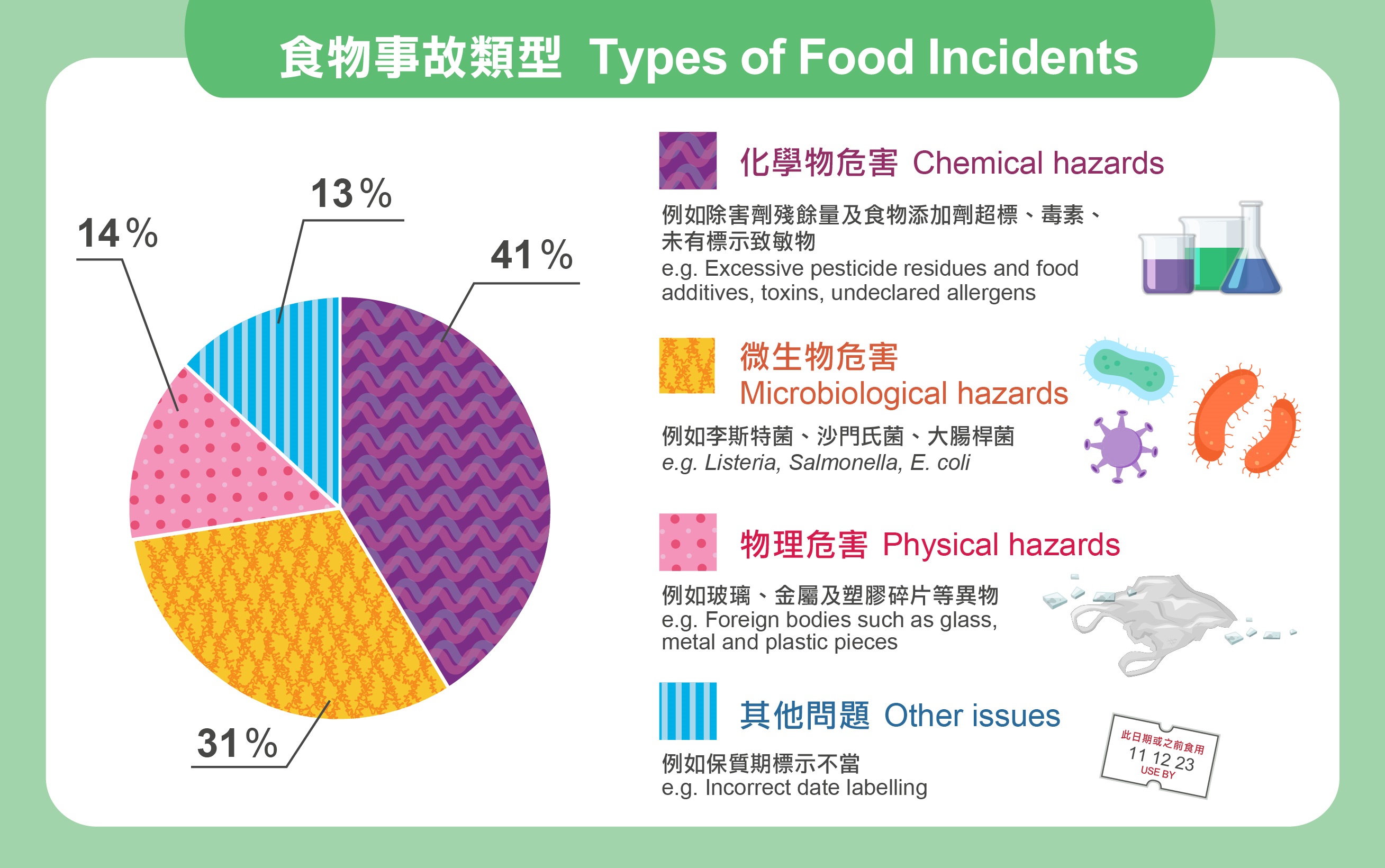
Food Safety Focus (211st Issue, February 2024) – Article 1
Review of Food Incidents in 2023
Reported by Dr. Man-leung WANG, Medical & Health Officer,
Risk Management Section, Centre for Food Safety
The Centre for Food Safety (CFS) has established a Food Incident Surveillance System (FISS) to proactively monitor and identify food incidents occurring outside Hong Kong that could potentially affect local food safety. The CFS also collaborates with international food safety networks like the International Food Safety Authorities Network (INFOSAN) and the European Union's Rapid Alert System for Food and Feed (RASFF). These partnerships improve inter-agency coordination and communication, which improves the effectiveness of our management of food incidents.
Food Incidents in 2023
In 2023, the CFS detected 3,500 food incidents through the FISS. The CFS investigated the availability of the implicated products locally by reviewing import records, coordinating with relevant authorities, and conducting checks with local traders.
Upon discovering the availability of the implicated products in the local market, based on the risk assessment and in compliance with local regulations, the CFS implemented various risk management measures. These included discontinuing the sale of affected products, initiating product recalls, intensifying surveillance efforts, and suspending imports as required.
The CFS effectively communicated and provided comprehensive food safety advice to the public on food incidents, particularly those of local relevance. The CFS issued press releases, trade alerts, and food/allergy alerts to inform consumers and the trade about product recalls when necessary. Food Incident Posts were issued when affected products were evaluated as not having major impact locally.
In 2023, there were 567 food incidents that required follow up action. The CFS responded by issuing 557 food incident posts, 18 press releases, 19 trade alerts, and 35 food alerts/allergy alerts, involving chemical hazards (e.g. use of excessive food additives, toxins, undeclared allergens), microbiological hazards (e.g. Listeria, Salmonella, E. coli), physical hazards (e.g. foreign matters), and other issues (e.g. incorrect date labelling). The majority of the food incidents were related to chemical and microbiological hazards, which accounted for 41% and 31% respectively.
 Figure: Types of food incidents with public announcements made in 2023 (The figures do not add up to 100% due to rounding.)
Figure: Types of food incidents with public announcements made in 2023 (The figures do not add up to 100% due to rounding.)
Risk Management of Food Incidents
The two examples below illustrate how the CFS effectively manages food incidents detected through the FISS and how the CFS collaborates with international food safety networks to promptly implement control measures.
Bakery Products from Austria Made with Czech Republic Wheat that were Detected with Chlorpyrifos
In June 2023, the CFS received a notification from the RASFF that various bakery products were made with wheat from the Czech Republic, which was found to contain chlorpyrifos up to 3.6 mg/kg. Additionally, a batch of affected prepackaged bakery products from Austria was planned to be distributed to Hong Kong.
Chlorpyrifos is an insecticide. Ingesting chlorpyrifos may result in a variety of nervous system effects including coma and death, depending on the exposure. According to the Pesticide Residues in Food Regulation (Cap. 132CM), the maximum residue levels for chlorpyrifos in wheat is 0.5 mg/kg.
Upon receipt of the notification, the CFS immediately followed up with the concerned importer, and confirmed that the affected products were still on their way shipping to Hong Kong. All the affected products were voluntarily surrendered and disposed of by the importer under the supervision of the CFS on their arrival to Hong Kong.
This case demonstrated the successful collaboration between the CFS and international food safety agencies, highlighting the significance of early notification in averting the occurrence of worldwide food-related incidents in Hong Kong.
French Raw Milk Cheese Suspected to be Contaminated with Shiga Toxin-producing E. coli (STEC)
In December 2023, the CFS identified through the FISS a notification from the Rappel Conso of France that the raw milk cheese product was being recalled in France due to possible contamination with STEC.
From time to time, there were reports that cheese made from raw milk was contaminated with harmful bacteria and implicated in outbreaks of foodborne diseases. STEC is a pathogenic strain that can produce the Shiga toxin and can cause severe illnesses, including bloody diarrhoea and haemolytic-uraemic syndrome leading to kidney failure.
By conducting local sales checks at both the import and retail levels, the CFS verified that the affected product had been imported to Hong Kong by a local importer. The CFS immediately instructed the importer to cease sales, remove the products from shelves, and initiate a recall. A press release was issued to advise the public not to consume the affected products and urged the trade to stop using or selling the products concerned immediately.
Conclusion
The FISS effectively monitors food incidents outside Hong Kong, enabling the CFS to swiftly mitigate the public health impacts of food incidents and protect local food safety.

